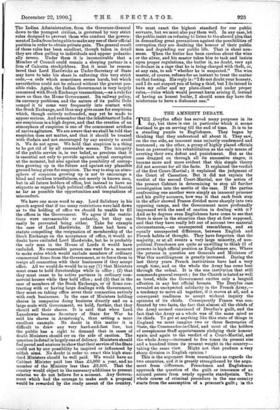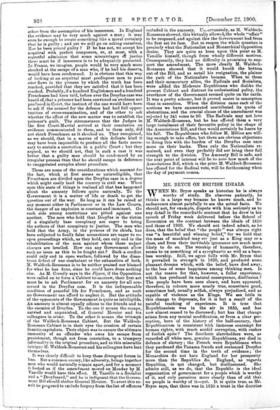THE AMNESTY DEBATE. T HE Dreyfus affair has served many purposes
in its day, but there is one in particular which it seems destined to go on serving till the end of time. It is to be a standing puzzle to Englishmen. They began by thinking that they understood all about it. They saw, on the one side, an innocent man unjustly condemned and sentenced; on the other, a group of highly placed officials bent on preventing his rehabilitation as the only means of averting their own defeat and punishment. But as the case dragged on through all its successive stages, it became more and more evident that this simple theory did not account for all the facts. It explained the verdict of the first Court-Martial ; it explained the judgment of the Court of Caseation. But it did not explain the verdict of the second Court-Martial, nor the action of the present Cabinet in determining to stop all further investigation into the merits of the case. If the parties confronting one another were simply an innocent prisoner and his guilty accusers, how was it that each fresh step in the affair showed France divided more sharply into two opposing camps, and the Government more profoundly impressed with the need of caution in dealing with it ? And so by degrees even Englishmen have come to see that there is more in the situation than they at first supposed, and that they have really left out of account two material circumstances,—an unsuspected resemblance, and an equally unsuspected difference, between English and French habits of thought. They have forgotten that the majority, or at all events a very large minority, of non- political Frenchmen are quite as unwilling to think ill of persons in high official position as Englishmen are. Where the persons in question are Generals and Ministers of War this unwillingness is greatly increased. During the last thirty years French institutions have had a very rough time, and on the whole the Army has come best through the ordeal. It is the one institution that still commands general respect ; for the Church is hated as well as loved, while the Government excites only a languid affection in any but official breasts. The Dreyfus case revealed an unexpected solidarity in the French Army,— a tendency to move all together, if it moves at all, and a consequent readiness to accept without inquiry the opinions of its chiefs. Consequently France was con- fronted by two facts, the fact that almost all the chiefs of the Army seemed convinced of Dreyfus's guilt, and the fact that the Army as a whole was of the same mind as its chiefs. To get at anything like this state of things in England we must imagine two or three Secretaries of State, the Commander-in-Chief, and most of the holders of conspicuous Staff appointments pledging their honour again and again to the verdict of a Court-Martial, and the whole Army—increased to five times its present size and a hundred times its present weight in the country— taking the same view. Might not that produce a very sharp division in English opinion % This is the argument from resemblance as regards the two countries, and it is greatly strengthened by the argu- ment from difference. Frenchmen and Englishmen approach the question of the guilt or innocence of an accused person from nearly opposite standpoints. The whole course of criminal procedure in the one country starts from the assumption of a prisoner's guilt ; in the other from the assumption of his innocence. In England the evidence may be very much against a man ; it may even be enough to create something like a moral certainty that he is guilty ; and yet we still go on asking ourselves, Has he been proved guilty ? If he has not, we accept his acquittal with perfect composure, or, at most, with a regretful admission that some miscarriages justice there must be if innocence is to be adequately protected. In France, we imagine, people would be very much more shocked at the escape of a man who, if he had his deserts, would have been condemned. It is obvious that this way of looking at an acquittal must predispose men to pass over flaws in the process by which the truth has been reached, provided that they are satisfied that it has been reached. Probably, if a hundred Englishmen and a hundred Frenchmen had been told, before ever the Dreyfus case was heard of, that a prisoner had been convicted on evidence not pro3uced in Court, the instinct of the one would have been to ask if the counsel for the defence had had full oppor- tunities of cross-examination, and of the other to ask whether the effect of the new matter was to establish the prisoner's guilt. The circumstance that the Judges in the first Court-Martial arrived at their conclusion on evidence communicated to then], and to them only, did not shock Frenchmen as it shocked us. They recognised, as we should, that in a matter of this delicate kind it may have been impossible to produce all the facts neces- sary to sustain a conviction in a public Court ; but they argued, as we should not, that in such a case it was better that a guilty man should be condemned by an irregular process than that he should escape in deference to exaggerated scruples about procedure.
These are some of the considerations which account for the fact, which at first seems so unintelligible, that Frenchmen are divided upon the Dreyfus case in a degree which might easily land the country in civil war. When once this state of things is realised all that has happened about the amnesty follows quite naturally. To the Government it is a matter of life or death to get the question out of the way. So long as it can be raised at any moment either in Parliament or in the Law Courts, the danger of an explosion is constant and imminent. On each side strong convictions are pitted against one another. The men who hold that Dreyfus is the victim of a singularly base conspiracy are eager to bring the authors of that conspiracy to justice. The men who hold that the Army, in the persons of its chiefs, has been subjected to foully false accusations are eager to re- open proceedings which, as they hold, can only end in the rehabilitation of the men against whom these unjust charges are levelled. How can any Government allow such an issue as this to be fought out ? Such a conflict could only end in open warfare, followed by the disas- trous defeat of one combatant or the exhaustion of both. M. Waldeck-Rousseau is to be neither praised nor blamed for what he has done, since he could have done nothing else. As M. Comely says in the Figaro, if the Opposition were called on to form a Cabinet to-morrow, their first act must be to ask Parliament for an amnesty for all con- cerned in the Dreyfus case. It is the indispensable condition of peaceful life for Frenchmen, and as such no Government can afford to neglect it. But the attitude of the opponents of the Government is quite as intelligible. An amnesty is almost equally odious to the friends and to the enemies of Dreyfus. To the one it means the escape, untried and unpunished, of General Mercier and his colleagues in crime. To the other it means the triumph of the Waldeck-Rousseau Cabinet. But the Waldeck- Rousseau Cabinet is in their eyes the creation of certain Semitic capitalists. Their object was to ensure the ultimate immunity of an offender who owes his escape from punishment, though not from conviction, to a trumpery informality in the original procedure, and to this miserable intrigue M. Waldeck-Rousseau and his colleagues have lent themselves.
It was clearly difficult to keep these divergent forces in line. But a common enemy, like adversity, brings together men who would naturally remain apart, and for a moment it looked as if the amendment moved on Monday by M. on ay y Vazeille would have this effect. M. Vazeille is a Socialist and a " Droyfusard," and he i3 indignant that the Govern. ment Bill should shelter General Mercier. To avert this re- sult he proposed to exclude forgery from the list of offences included in the amnesty. Uthortunately, as M. Waldeck- Rousseau showed, this virtually allowed,the whole "affair" to be reopened, and against this the Government had from the first set its face. But to reopen the whole question is precisely what the Nationalist and Monarchical Opposition desire. They are quite as keen upon this point as M. Vazeille himself, though from wholly different motives. Consequently, they had no difficulty in promising to sup- port the amendment. The more clearly M. Waldeck- Rousseau showed that it would knock the bottom out of the Bill, and so entail his resignation, the plainer the path of the Nationalists became. When to these and their momentary allies, the Radicals and Socialists, were added the Moderate Republicans who dislike the present Cabinet and distrust its ecclesiastical policy, the overthrow of the Government seemed quite on the cards. It was a pretty scheme, but it proved easier in conception than in execution. When the division came each of the sections we have enumerated contributed its quota of abstentions, and the crucial clause of the amendment was rejected by 341 votes to 90. The Radicals may not love M. Waldeck-Rousseau, but he has offered them a very large instalment of their favourite policy in the shape of the Associations Bill, and they would certainly be losers by his fall. The Republicans who follow M. 114line are will- ing enough to take office, but there are obvious objections to doing this with the burden of the Dreyfus case once more on their backs. Thus only the Nationalists re- mained, and even they probably did not bring their full strength to the division. The Amnesty Bill is safe, and the next point of interest will be to note how much of the Associations Bill, which is the price M. Waldeck-Rousseau has offered for the Radical vote, will be forthcoming when the day of payment comes.







































 Previous page
Previous page